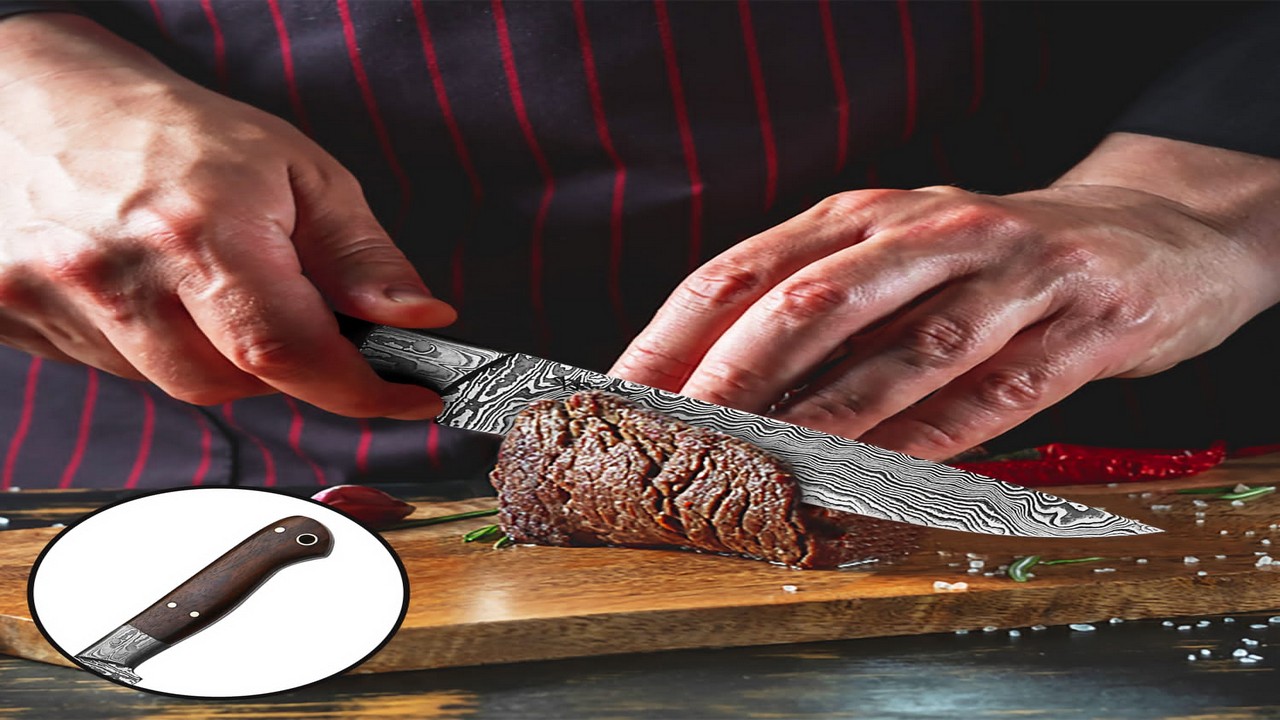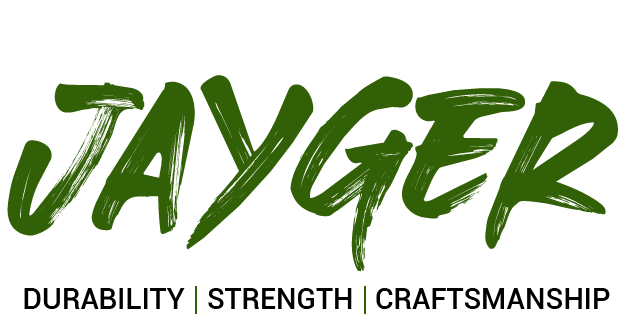Comparing Damascus and Carbon Steel Knives: The Ultimate Guide

Are you looking for the right Damascus or Carbon Steel knife to complete your kitchen? Whether it’s a Damascus Chef Knife, Meat Cleaver, Custom Design Chef Knife, or a knife from the UK, we’ve got you covered on all things Damascus Knives.
Composition and Manufacturing
Damascus Steel and Carbon Steel knives are two of the most popular blades, each offering unique features.
- Damascus steel knives feature a unique pattern on their blades due to the layering process from which they are created.
- Carbon steel knives are simpler, with fewer layers and a monochromatic look.
Both offer high resistance to rust and excellent edge retention. When deciding between the two, it’s essential to consider which knife best suits your needs regarding aesthetic appeal and its intended purpose.
Strengths and Weaknesses of Damascus Knives
Damascus steel knives are an exciting choice, as their custom design is breathtaking. The multiple layers of low and high-carbon steels possess a strength that is difficult to match. They are highly resistant to corrosion and rust while still having an excellent ability to retain an edge. While beautiful, these Damascus Chef knives can be noticeably heavier than carbon steel options due to their layered construction.
Additionally, if not correctly cared for, they can chip or suffer wear over time since the layers may separate due to normal wear and tear.
Sharpness
Damascus steel knives generally possess superior sharpness due to their use of harder steels and multiple layers, which helps the blade keep a cutting angle for longer when properly heat treated. Carbon steel options are not as hard and tend to dull faster, although they are still quite sharp unless abused or overlooked in regular maintenance. Both knives should be regularly honed and stropped with leather strops to maintain their edge.
Durability
Damascus chef knives are generally more durable than carbon steel blades due to their intricate patterning and heat-treating process, making them relatively corrosion-resistant. Carbon steel knives may still require oxidation or electroplating treatments to resist rust or tarnish if left unoiled. In contrast, Damascus steel can last through wet working environments without needing extra steps.
Maintenance
Taking good care of Damascus knives is essential for anyone looking to get the most from their investment. Because Damascus steel has more layers, sharpening them can be more complicated than regular carbon steel knives.
Regular oiling with mineral oil is recommended to keep the edge rust-free. Cleaning should also be done carefully—as the metal reacts rapidly with acidic soap or a cleaning agent, you should only use mild detergent and warm water to ensure it doesn’t rust.
Strengths and Weaknesses of Carbon Steel Knives
Carbon steel knives are tough and sharp, making them ideal for butchering or fileting. While they don’t rust as easily as Damascus, carbon steel knives require more care and maintenance than typical stainless steel blades. The high-carbon content means they will stain if not cared for correctly, so regular polishing and oiling are essential to prevent oxidation. Lastly, carbon steel tends to be more brittle than stainless steel and will shatter excessively pressure.
Rust-Resistance
Carbon steel knives offer better rust resistance than Damascus knives due to their lower iron content. A carbon steel blade is less prone to oxidation so it won’t suffer the same issues as a Damascus blade.
Additionally, many carbon steel blades are coated with a protective finish that helps ensure the knife remains rust-free for extended periods. It’s important to remember that all edges must be polished and oiled regularly, even if made from carbon steel, to maintain their resistance against rusting.
Versatility
Carbon steel knives are exceptionally versatile and can be used in various situations, making them ideal for most kitchen tasks. The forged carbon steel blades are highly durable and can easily tackle multiple cutting jobs without dulling quickly. From slicing vegetables to mincing herbs, this knife can handle it all quickly. Moreover, it is also corrosion-resistant, so you won’t have to worry about rusting or discoloration over time.
Maintenance
Sharpening the blade of a carbon steel knife is essential for keeping it in good condition. Regular sharpening keeps your knife’s edge sharper and improves its performance. Carbon steel knives require regular maintenance to prevent corrosion, as they are prone to rusting if not correctly cared for.
It is essential to clean and dry your knife after every use and avoid leaving it wet or exposed to harsh chemicals. Oil-based blades must also be oiled periodically to keep them in top condition.
Comparing the Performance of Damascus and Stainless Steel Knives Cutting, Chopping, and Slicing
Today’s chefs demand high-quality custom design chef knives designed to be ultra-sharp and handle any task. Damascus knives are preferred for their thinner blade and ability to retain sharpness better than carbon steel knives, making them well suited for cutting, slicing, and chopping various ingredients. On the other hand, carbon steel knives have an extra tough blade, making them perfect for stricter tasks like carving meat or filleting fish.
Choosing the Right Knife for Your Needs: Factors to Consider, and Which One is Right for You
When deciding between Damascus and Carbon steel knives or Meat Cleaver for your kitchen, you’ll want to consider their durability, weight, blade sharpness, care requirements, and price. Damascus knives are more expensive than carbon knives; however, their thin blade and ability to retain edge make them ideal for everyday tasks in the kitchen.
On the other hand, carbon steel knives are sturdier and have much thicker blades to stand up to stricter tasks like carving or filleting fish. Ultimately, the right choice depends on your needs – if you’re looking for a sharper edge that will last longer with minimum maintenance required, go with a Damascus knife.
